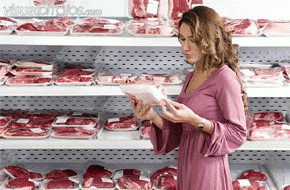
 Think for a moment that you’re a Western consumer contemplating buying some animal protein for dinner that night.
Think for a moment that you’re a Western consumer contemplating buying some animal protein for dinner that night.
Faced with an array of red and white meat choices, you have a tiny thought in the back of your mind about how the animal that produced that steak or mince or breast grew up.
(Ignoring anthropomorphism) mostly, you’re going to be aware that its life was pretty confined and squashed, and bears very little resemblance to how it would’ve existed in a ‘natural’ world.
However, you’ve got to eat, and pretty much you have Hobson’s choice when it comes to the production source of the meat.
Further imagine there’s meat product that has a pH and/or a pasture Harmonies co-brand sitting alongside a marketer’s brand, a sign of responsible pastoralism.
You know the pH story. That’s the one where a farmer works in with the seasonality of grass/clover/herb growth.
That’s the one where animals are outside, relatively free to wander, relatively free to express their natural behaviours.
That’s the one where a sustainable use of land is the goal – and where science has helped contribute to and verify that the planet’s not being harmed in the product’s creation.
That’s the one where there is an explicit invitation to VISIT – this production method has nothing to hide.
And, even though the steak or mince from the pH co-branded product costs more than its fellow chiller-mates, you appreciate there’s something more heartfelt, something more uplifting about buying it compared to the others.
All in all, the pH product ticks all the right ethical, moral and emotional boxes (let’s call it a heart) – allowing the head to follow. In fact, such a consumer is standing there thinking, ‘if I was a farmer, that’s the way I’d want to farm’.
That, I argue, is what we ‘risk’ by owning our story.
We risk connecting with a consumer in a way that nobody else has.
We risk laying claim to a market position that others, simply, understand.
We risk putting ourselves in the position of global leaders in responsible pastoralism and providing ourselves and our children’s children with a sustainable business model beyond commodity.
All that, I argue, through owning our story ... and we’d own our story by naming it. Is it a risk worth taking?
----------------------------------------------------------------------
Peter Kerr is a writer, specialising in simplifying science and technology. He has an agricultural science and industry background. You can contact him here »
This is the sixth in a series about pasture Harmonies.
The first one Branding our pastoral advantage is here »
The second one We're the only protein production systems that can say VISIT is here »
The third one Taking it for granted is costing us is here »
The fourth one Thinking beyond the actuality of how we produce is here »
The fifth one For want of a name ... is here »
2 Comments
you are right Peter
There is a lot of effort going into this by the industry at the moment. Though I must admit that it is some what splintered by different entities doing there own thing in some cases. I beleive a more coordinated effort would have more impact. The amalgamation of some of the larger players could have a big impact on driving this effort.
Good start, and on the right track.
Oxymoronic pic though - plastic blister-packs, transported by oil........... :)
We welcome your comments below. If you are not already registered, please register to comment
Remember we welcome robust, respectful and insightful debate. We don't welcome abusive or defamatory comments and will de-register those repeatedly making such comments. Our current comment policy is here.